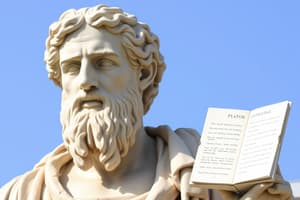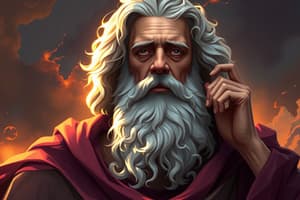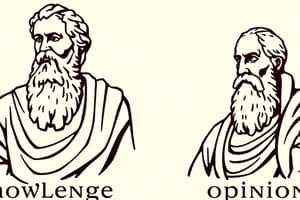Podcast
Questions and Answers
What is the primary dilemma presented in Meno’s Paradox?
What is the primary dilemma presented in Meno’s Paradox?
- How can you search for something if you have no motivation to do so?
- How can you search for something you already know?
- How can you search for something if you have no knowledge of it?
- How can you search for something you don't know? (correct)
According to Socrates, what is the essence of virtue?
According to Socrates, what is the essence of virtue?
- A collection of different qualities for different people.
- The acquisition of good things.
- The ability to rule over others.
- Wisdom and knowledge applied to ethical action. (correct)
What conclusion does Socrates arrive at regarding the teachability of virtue?
What conclusion does Socrates arrive at regarding the teachability of virtue?
- Virtue is teachable, however, identifying the true teachers of virtue is a complex task.
- Virtue is not teachable at all, and only comes from divine inspiration.
- Virtue is definitively teachable through formal instruction.
- Virtue may not be solely teachable, but rather a combination of divine inspiration and individual effort. (correct)
According to the Theory of Recollection, how can humans acquire knowledge?
According to the Theory of Recollection, how can humans acquire knowledge?
Which of the following is NOT a key theme explored in Plato's Meno?
Which of the following is NOT a key theme explored in Plato's Meno?
In the Slave Boy Experiment, what is the primary purpose of Socrates' questioning?
In the Slave Boy Experiment, what is the primary purpose of Socrates' questioning?
Which of the following BEST reflects the overall message of Meno?
Which of the following BEST reflects the overall message of Meno?
What is Meno's initial definition of virtue?
What is Meno's initial definition of virtue?
Which of the following is NOT a reason why Socrates believes virtue cannot be taught?
Which of the following is NOT a reason why Socrates believes virtue cannot be taught?
What is the key difference between true opinion and knowledge, according to Socrates?
What is the key difference between true opinion and knowledge, according to Socrates?
According to Socrates, what is the primary reason why political leaders make good decisions?
According to Socrates, what is the primary reason why political leaders make good decisions?
What does Socrates's bee analogy illustrate in regards to Meno’s definition of virtue?
What does Socrates's bee analogy illustrate in regards to Meno’s definition of virtue?
Why does Socrates reject the definition of virtue as "the ability to rule"?
Why does Socrates reject the definition of virtue as "the ability to rule"?
What is the primary focus of Socrates's dialectic method, as described in the passage?
What is the primary focus of Socrates's dialectic method, as described in the passage?
Why does Socrates conclude that everyone ultimately desires good things?
Why does Socrates conclude that everyone ultimately desires good things?
How does Socrates modify Meno’s comparison of him to a stingray?
How does Socrates modify Meno’s comparison of him to a stingray?
Flashcards
Socrates on virtue
Socrates on virtue
Socrates argues that virtue cannot be taught due to the absence of clear teachers.
True opinion vs. knowledge
True opinion vs. knowledge
True opinion is correct belief without reasoning; knowledge is justified understanding.
Socrates on political leaders
Socrates on political leaders
Socrates believes political leaders act rightly through divine inspiration, not knowledge.
Defining virtue
Defining virtue
Signup and view all the flashcards
Meno's definitions of virtue
Meno's definitions of virtue
Signup and view all the flashcards
Virtue and ruling
Virtue and ruling
Signup and view all the flashcards
Desire for good
Desire for good
Signup and view all the flashcards
Meno's stingray analogy
Meno's stingray analogy
Signup and view all the flashcards
Meno's Paradox
Meno's Paradox
Signup and view all the flashcards
Theory of Recollection
Theory of Recollection
Signup and view all the flashcards
Virtue
Virtue
Signup and view all the flashcards
Socrates' Method
Socrates' Method
Signup and view all the flashcards
Divine Inspiration
Divine Inspiration
Signup and view all the flashcards
Definition of Virtue
Definition of Virtue
Signup and view all the flashcards
Socrates' Belief on Virtue
Socrates' Belief on Virtue
Signup and view all the flashcards
Meno's Attempts at Definition
Meno's Attempts at Definition
Signup and view all the flashcards
Study Notes
Meno Dialogue: Summary and Study Notes
- Central Question: Can virtue be taught?
- Meno's Paradox: How can one search for something they don't know?
- Initial Virtue Definitions: Meno proposes varied definitions for different groups (men, women, children, slaves), implying multiple virtues.
- Socrates' Response: Seeks a single, universal definition of virtue.
- Meno's Subsequent Attempts: Introduces definitions of virtue (ruled by power, desiring and acquiring good things), each challenged by Socrates.
- Socrates' Critique: Argues that these definitions are incomplete; they don't encompass the essential elements required for virtue (justice, wisdom, fairness).
- Theory of Recollection (Socrates): The soul possesses inherent knowledge from past lives, and learning is recalling this knowledge.
- The Slave Boy Experiment: Socrates guides a boy to discover geometric truths through questioning, demonstrating innate knowledge.
- Virtue as Teachable? (Doubt): Socrates questions if virtue can be taught by focusing on the lack of easily identified teachers of virtue. Suggests alternative explanations like divine inspiration.
- True Opinion vs. Knowledge: True opinion is correct belief without understanding; knowledge is justified understanding.
- Political Leaders/Divine Inspiration: Socrates considers that leaders might act virtuously not through learned knowledge, but through divine inspiration or innate qualities.
- Key Themes: Virtue's nature, the Theory of Recollection, the role of questioning, and the nature of teaching virtue.
- No Definitive Answer: The dialogue leaves the question of teaching virtue unresolved, prompting further investigation.
- Socrates' Bee Analogy: Socrates uses an analogy, clarified, to illustrate his own process of seeking answers, showing doubt & curiosity in himself.
Additional Study Questions Analysis
- Defining Virtue First: Socrates believes a precise definition of virtue is crucial to evaluating its teachability.
- Meno's Flaw in Definition: Meno's initial definition fails to identify a universal essence shared by all virtues, instead describing diverse instances.
- Weakness of "Rule" Definition: The "ability to rule" definition lacks completeness. Justice, fairness, and wisdom are still essential elements of virtue, not just ability to control.
- Dialectic's Importance: Logical reasoning and questioning are key to discerning truth and clarifying concepts beyond simple facts.
- Desire for Good: Socrates and Meno reason that people inherently desire good things and only pursue apparent 'evil' if they mistakenly believe it brings benefit.
Studying That Suits You
Use AI to generate personalized quizzes and flashcards to suit your learning preferences.




